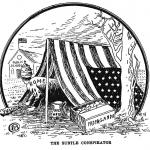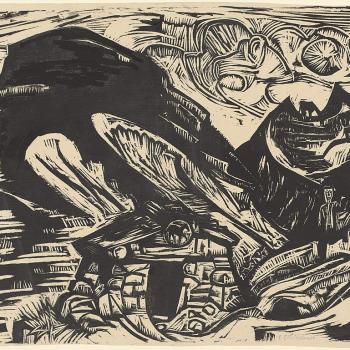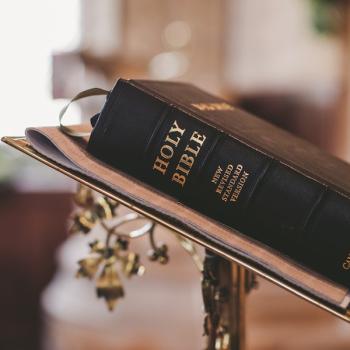This is the woman who tells us “sin is naught” and that “all shall be well; all shall be well; and all manner of thing shall be well.” Her emphasis on personal unworthiness combined with love of other was astounding. Here was a woman, an anchoress, that is a woman who lived alone, attached to a small cell adjoined to a church, who concentrated on her own sin, despite her holy life. Of course, many a saint felt this way; I dare say all of them did. Still, Julian seemed even more remarkable; her life emanated the Gospel. Her concern was never condemning others, but emphasizing God’s desire to save all, even as she doubted that God could want to save one as filthy as herself (or so she intimates). What Julian gave me was a faith obsessed with charity in all its dimensions, a faith that spends so much time digging for the log in its own eye, it never has time to glance up at the speck in its neighbor’s. Would that I could ever achieve half of her holiness (insofar as these things can be quantified. Spoiler: they can’t).
As a final note, I’d like to mention a poem that really changed my life: Piers Plowman. It’s far too long and complex for me to summarize here. Suffice it to say that the author, William Langland, was concerned with how to live the Gospel in a corrupt world, specifically in a world in which institutional structures (including the Church) offered no guidance. Among the first things to happen in the poem is the protagonist’s discussing how he ought to act with an allegorical figure called “Holy Church.” She basically tells him it’s easy:
“It is natural knowing,” quoth she · “that teacheth thine heart
For to love thy good Lord · liefer than thyself;
No deadly sin to do · die though thou shouldest:
This I trow to be Truth · who can teach thee better,
See you suffer him to say · and then teach it after.
For thus witnesseth his words · work thou thereafter;
For Truth telleth that Love · is the remedy of Heaven;
No sin may be seen in him · that useth that sort,
And all his works he wrought · with Love as he listed;
And taught it Moses for the best thing · and most like to Heaven
With the plant of peace · most precious of virtues.”
Her exit is abrupt and disappointing:
Many pastors keep themselves · clean in their bodies
But are cumbered with covetousness · they can not drive it from them
So hardly hath avarice · hasped them together.
And that is no truth of the Trinity · but treachery of hell,
Lessoning the unlearned · to withhold their alms.“Therefore these words · are written in the Gospel,
Date et dabitur vobis · for I give to you all.
And that is the lock of Love · that letteth out my grace
To comfort the care full · encumbered with sin.“Love is leech of life · and next our Lord’s self,
And also the right road · that runneth unto Heaven;
Therefore I say as I said · before by the texts,
When all treasures be tried · Truth is the best.
Now have I told thee what Truth is · that no treasure is better;
I may linger no longer thee with · now look on thee our Lord!”
But the protagonist remains disappointed:
Yet I knelt on my knees · and cried of her grace,
And said: “Mercy, Madame · for Mary’s love of Heaven,
That bore that blissful Child · that bought us on the rood,
Teach me by some skilled way · Falsehood to know.”
Yet, the poem is thoroughly Catholic (see Catholic convert David Aers’ new book on this point). Later on a character named “Hunger” is brought in to keep lazy peasants in line, a dream-within-a-dream leads to Adam and the Patriarchs exploding out of an apple and falling into Hell (again), and a quasi-Jesus figure jousts with Satan. I love the poem so much that the name of this blog comes from it!
Anyway, I won’t give away the ending, but Piers remains raucously funny, amazingly smart, and reform-minded without breaking with the Church. In short, it helped me to see how to do concretely what Julian preached: live and love in a fallen world.
This series of posts has gotten long enough. These days, I mostly attend Ruthenian Catholic divine liturgy, partly because of a deep and abiding respect for Eastern theology, and partly because I’m a contrarian (or so I tell myself). My faith remains young as I strive to remain a child for Christ. My journey has taken me from chronic illness and the loss of my mother to a belief in salvific self-abnegation in the name of a 1st-century Jewish God-man. My sorrow and pain became a desire to live for others in a spirit of unending charity. And yet, I fail every day, always trying, remembering that God is beyond all of our systems and explanations, a deity so far above our understanding, and so rich in love, that He became man and suffered as we suffer.
Christianity demands holy foolishness of us. That much I know.













